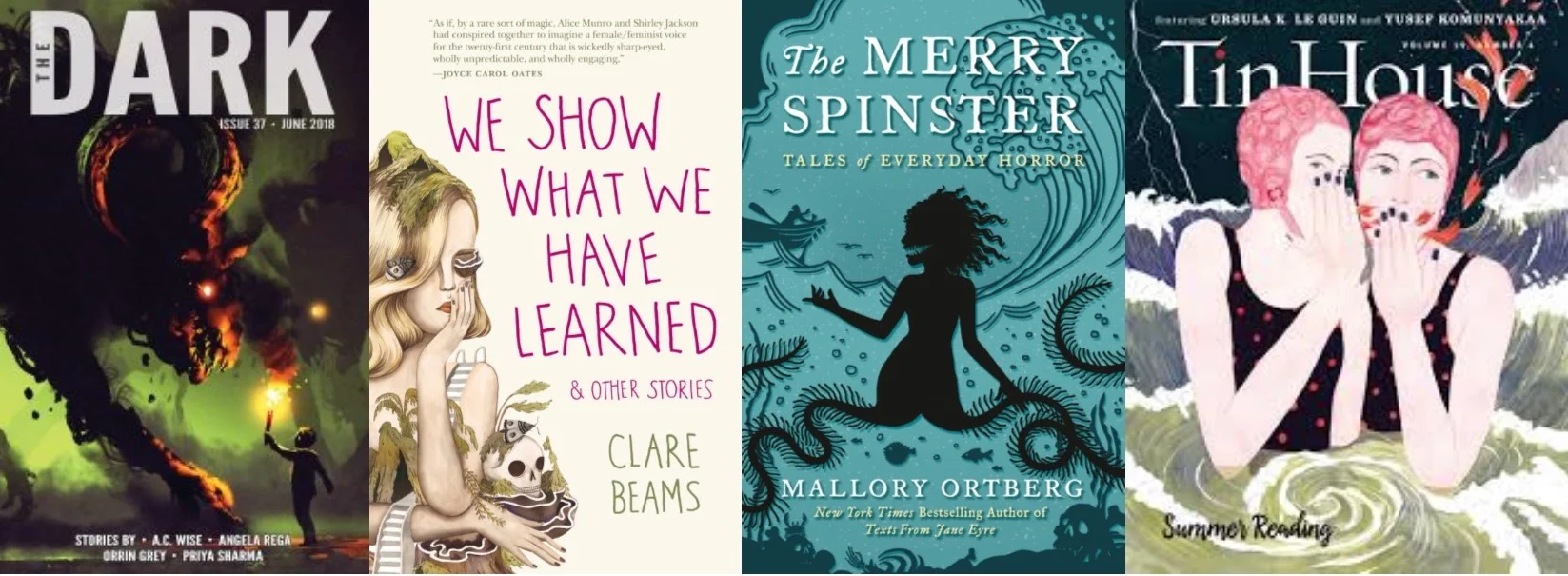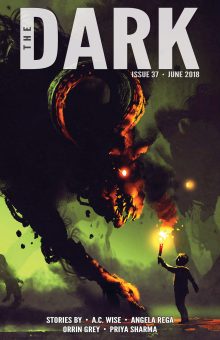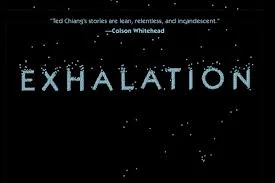As a kid, August signaled the end of summer as school filtered back into session, ending the days of long evenings, early morning swim practice, and (when in Arkansas), fireflies and cicadas filling the forests with light and sound as the sun sank and the moon rose. Luckily, the collegiate calendar is garbage, and August is not the end of summer, but dead center. If I’d known this as a child, I wouldn’t have complained so frequently about September – this so-called-fall’s – unrelenting heat. It all makes so much more sense now.
To mark the occasion of summer’s midpoint, I’ve compiled a list of a few of the best speculative short stories I’ve read since summer’s inauguration back in June. There’s a theme in these stories I noticed only after compiling my notes, and that’s the presence of monsters and madness, of coming undone at the same time a character becomes someone or something else entirely. Some of these pieces are recent and some are not, but what good are long summer nights if not for dipping into both new releases and back catalogues? Be sure to share your favorite summer stories in the comments below. I’ll just be over here enjoying the beginnings of garden tomato season and good books while the kids go back to bells and report cards. I’ll drink coffee in my slippers as the 6 AM bus pulls out of the stop just beyond my kitchen window, relaxed in the knowledge I can go an afternoon without having to chase away boys on bicycles digging up my mulch in search of roly-polies. Maybe my satisfaction at having the remainder of summer to myself makes me some sort of monster? At least through these stories, I have good company.
"In the End it Always Turns Out the Same" by A.C. Wise, The Dark, June 2018
Did you watch Scooby Doo as a kid? Doesn’t matter, you know the premise. And that’s the point of “In the End it Always Turns Out the Same.” Wise takes the one-dimensional characters of the Scooby Squad (with nods to Buffy the Vampire Slayer, too) and remolds them as real people with backstory and trauma and uncertainty about the roles they’ve been cast to play. Wise gives this treatment to the presumed villain, too, reminding us how stereotypes work to demonize innocent people and make monsters of those too lazy or scared to push past the boundaries of the obvious “answers.”
The story is about lies and truths, visiting the inner life of each character as they converge to “reveal” the murderer of children. Helen is “the pretty one,” the girl who dreams of having a body that is loved and accepted just for existing, even if that acceptance only comes from a dog.
“Helen has learned that most people only think they know what monsters look like. They walk past real monsters every day and never see them at all, which is why the monsters she meets go around in disguise. It’s the only way anyone will ever recognize them, and they are all so desperate to be seen.”
Greg is Fred, the wealthy son of a father who “was the first man who ever hurt him, but he wasn’t the last one.” Tricia is Velma, the smart one who is so used to being on the receiving end of lies that, for all her knowledge, she can’t recognize truth when it crystalizes in front of her: “Her parents have always told her she’s deathly allergic, even though the dog hairs on her sweaters don’t even so much as make her itch. It’s the greatest mystery she’s ever encountered.” Rooster is Shaggy, the burnout, the soldier returned home unable to distinguish the present from memories of the horror encountered at war. Finally, Wise introduces Old Man McGinty, the bus driver, the man who can see the ghosts of the murdered children:
“There are so many rumors, none of them true. He doesn’t even really mind; it’s just the way kids are. It comes with the job, it comes with being “old”, with being a little too quiet, a little lonely, a little odd.”
McGinty knows who the murderer is, but when lies speak louder than truth and real faces are the ones presumed to be masks, there is no place safe for those mistaken as monsters to hide.
"Quietly Gigantic" by K. C. Mead-Brewer, June 11 2018 Strange Horizons
This story is, in many ways, a modern retelling of Charlotte Perkins Gillman’s “The Yellow Wallpaper,” in that it chronicles the descent of our narrator into madness within the enclosure of an inescapable house. Beyond its meditation on madness, “Quietly Gigantic” is a story about invasions. It starts innocently: Maya is a Brooklynite who travels south to housesit for her friend, Raimy, in Austin. Raimy is an old friend, and Maya has seen her through both the trials of childhood and three marriages. Raimy’s house is in a gentrifying neighborhood, one of many I’m familiar with after living in Austin for three years before moving to Denver, another city grappling with rampant gentrification. Each summer that I lived in Austin I moved apartments, moving farther and farther out from the city’s center as the rent rose faster than the searing temperatures.
“She doesn’t appreciate feeling like the White Plague, as she calls it, but here she is anyway. Here I am.”
As children, Raimy and Maya played “zombie invasion” in Raimy’s “cavernous” home: “The magnifying glass was the only way for the hunter to see the zombie for what she was. Without it, she could appear utterly normal, a regular girl just having lunch, a T-O, doing homework. This is the true power of the zombie: to hide in plain sight.” Even without real zombies, Raimy’s house is not safe. Her father makes Maya kiss his “golden” hands, the first violation of boundaries in Maya’s young life. In Raimy’s Austin home, Maya is told “I should help myself to anything, everything. But it isn’t reassurance I need. It’s boundaries.” People need boundaries. Relationships, including lifelong friendships, need boundaries. Even the mind needs boundaries, lest it begin to unwind one strand at a time. Remembering Raimy’s father’s behavior, Maya considers.
“People shouldn’t feel welcome to everything in a house, even when it’s their own.”
Despite knowing this, Maya oversteps social boundaries, going through all of Raimy’s things, even trying on her clothes: “In her clothes, her silk and cotton against me, I can almost pretend it’s skin. It’s her.” As the days pass, Maya worries about the cockroaches Raimy claimed have infested the house. Maya begins to dream of roaches infesting her skin; of the cat turning into a zombie. Roaches. Zombies. Unwelcome advances. Gentrification. The infestations of the world begin to unravel Maya as she sinks deeper into memories of violations, invasion, and trauma. By the end of the story, not even the reader is sure what’s real and what’s not, and in this way, Mead-Brewer has pulled off an invasion of our own orientation in time and place, forcing us to reach out and feel for the boundaries of our own stability, hoping in darkness that the walls are sound.
"Rich People" by Abbey Mei Otis, Tin House Summer Reading Volume 19 #4
“Nobody stopped me,” opens Abbey Mei Otis’s short-short story. And isn’t that the excuse of all invaders throughout time? The narrator has always eyed the mansion from outside, and now takes advantage of the open doors of a party to slip inside like an invited guest.
“Nearly every day I passed by this house. I know its outside like a favorite picture book. The shards of glass embedded in the top of the garden wall, the gargoyles vomiting dirty water. I had always imagined what lay inside to be painted in colors that my eyes could not comprehend. Instead it felt as though I were descending deeper into my own brain.”
What she finds inside would make Kubrick’s Eyes Wide Shut blush in its decadence and absurdity, and what the reader finds is a story of appropriation, of stolen identities and veneration of the “exotic” through slaughter presented in literal skin – both wearable and edible.
“Some people there were even rich enough that they could slice off little bits of their own flesh and serve it to their friends on top of rice balls, like sushi. They nibbled each other, and there were little gilt comment cards on which they rated their friends based on freshness and tenderness of flesh, superlative mouthfeel, choiceness of cut.”
The narrator quickly realizes she’s made a mistake by venturing into this world uninvited. Where at first she feared the lack of acceptance, she ultimately learns there is something much worse to fear than being outed as an outsider; that worse than being an interloper, is being assimilated without ever having the choice to say no.
“We Show What We Have Learned” from We Show What We Have Learned & Other Stories by Clare Beams
Where some stories, like “Quietly Gigantic,” explore the internal undoing of a character, others, like Clare Beams’ title story in her collection, explore the literal, physical manifestation of a character coming unbound at the seams.
“Before her disintegration, we had long held an absolute and unwavering contempt for Ms. Swenson.”
It’s amazing how quickly a person can go from a creature of contempt to a creature of fascination, the moment something about them becomes a mystery. And what, to adults and children alike, could be more mysterious than a woman who begins to fall apart piece by piece, but carries on as though nothing is happening?
It’s no coincidence that “the day the disintegration began, we were learning about Native American civilization.” Ms. Swenson is drawing a wigwam on the board as she laments the colonization and brutal conquest of North American indigenous people – cultures that colonization attempted to disintegrate and abolish completely. Even Ms. Swenson and the children’s presence in the school, on that land, is a legacy of that disintegration by way of invasion. Then, Ms. Swenson loses an earlobe.
As the days pass, the students “wondered which words would move her enough to move a piece off of her, and the wondering made us really listen to those words, which made us learn from them, in most cases for the first time.” The children become better students as their teacher comes apart at the blackboard, but there’s only so many pieces a person can lose before they have nothing else to give.
“Show me children!” Ms. Swenson screams as her face falls away from her head. Here is the final test of Ms. Swenson’s lessons: have they been paying attention to what she has taught them about the dark legacy of their existence? Beams doesn’t mind if it makes the reader squirm; isn’t that the consequence and point of staring our own past down its rotten nose?
“The Daughter Cells” From The Merry Spinster by Mallory Ortberg
The first story in Ortberg’s collection of fairy tale retellings is a dark take on Hans Christian Anderson’s original Little Mermaid story. In this story, though, Ortberg makes it clear that the title character – “You might call the daughters princesses. I wouldn’t, but if it’s easier for you, then you might” – is most certainly not a girl, and is probably not even part fish, judging by the girl’s abhorrence at any creature that lacks “radial symmetry.” I pictured a starfish, although an anemone or urchin or even a sea cucumber might be apt. The sea witch, too, is no mermaid or octopus, but instead some type of mollusk or worm.
True to the source material, the girl/sea star/cucumber falls in love with a prince and undergoes a magical transformation to become a human in search of a soul and the prince’s heart. Like the original, she also lacks a voice, but not out of malice on the sea witch’s part, the sea witch can just only do so much. This is a pragmatic tale, after all, much like the girl herself. When pragmatism is introduced into a fairy tale, the yarn can be spun much differently than its predecessor. And when the girl abides by the ethics of wild animals rather than human social norms, the ending can become something new, entirely – much like the girl herself. What is a monstrosity when the ethical goal posts are moved, or were never in play at all? The narrator can’t say, of course. This is a fairy tale, after all.















A look back at Anya DeNiro’s mind-bending weird fiction collection, Tyrannia and Other Renditions.